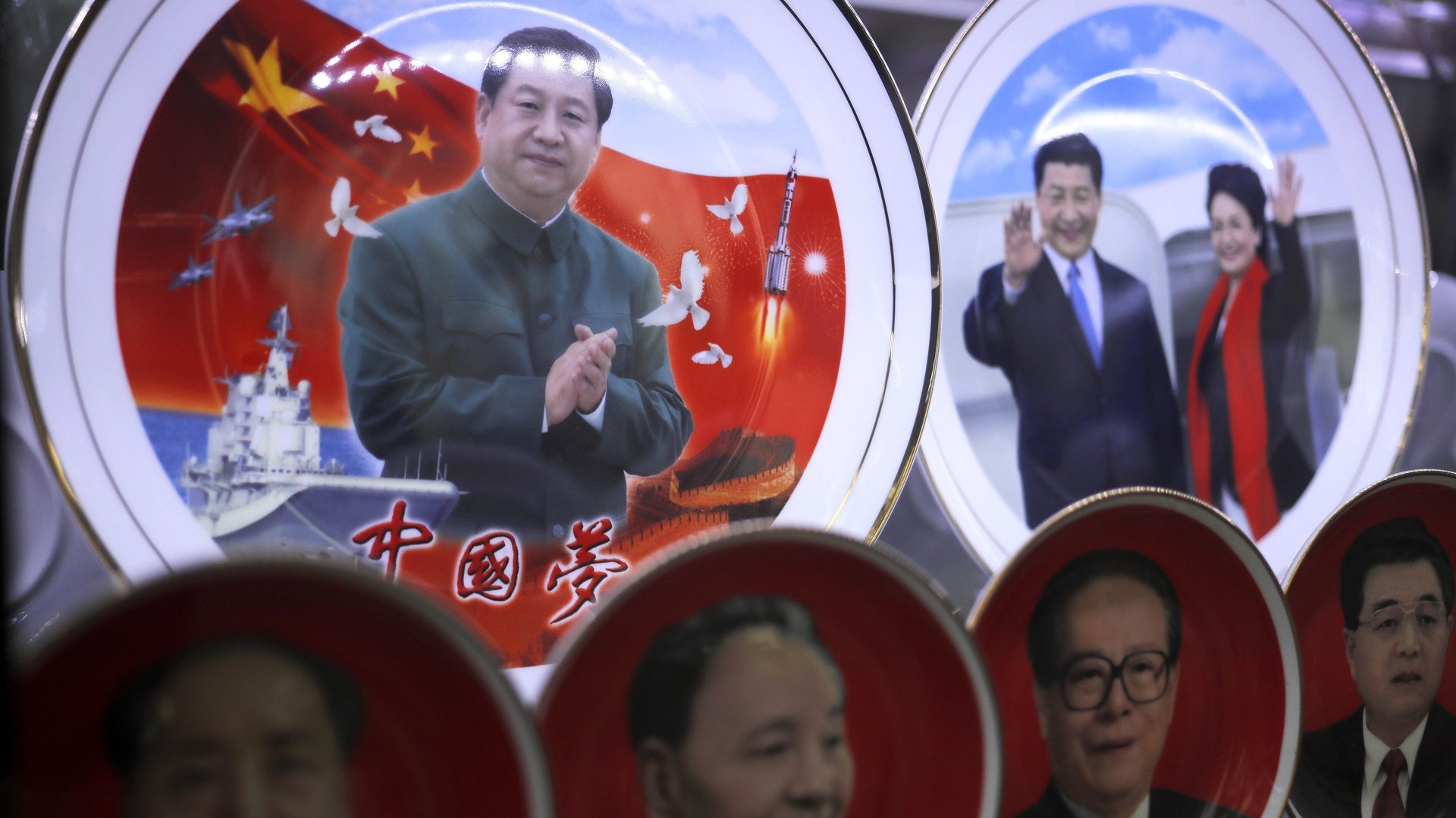Xi Jinping is becoming a “core” Communist Party leader for a very different reason than his predecessors
China’s president Xi Jinping is now officially the “core” of the ruling Communist Party, a sign that the strongman leader is consolidating his power to a level unprecedented since Mao Zedong ruled it with an iron fist.


China’s president Xi Jinping is now officially the “core” of the ruling Communist Party, a sign that the strongman leader is consolidating his power to a level unprecedented since Mao Zedong ruled it with an iron fist.
All party members should “closely unite around the Central Committee with Comrade Xi Jinping as the core,” said an official communique (link in Chinese), released after a key meeting for the party concluded yesterday (Oct. 27) in Beijing.
Xi is not China’s first “core” leader. His predecessors Mao, Deng Xiaoping, and Jiang Zemin were also officially endorsed as the “core” leaders of their generations (Mao posthumously). But yet when Deng—who led China’s economic reform after Mao’s death—first coined the term in late 1980s, the very word “core” was raised for a different purpose.
Then, it was used to ensure a smooth transition of power between Deng and Jiang. Now, Xi appears to be using it to strengthen his grip on power himself.
The new designation for Xi came at the end of the sixth plenum, a four-day conclave for nearly 400 top officials, that is the most important meeting before the party shuffles its leadership late next year. The plenum’s theme was “comprehensively strictly governing the party” and it is due to approve two documents on tightening party discipline. Yet the highlight of Thursday’s communique (link in Chinese), released through state media, was the emphasis that Xi becomes a “core” leader.
Championing Xi as the “core” is a reflection of the ”common wish of the entire party, the entire army and the Chinese people of all ethnic groups” and is “the fundamental interest of the party and the nation,” said an editorial published today (Oct. 28) by state newspaper People’s Daily. Dozens of provincial-level party bosses already vowed to support Xi’s new designation, in an unofficial campaign that kicked off in January.
The term was first used in the party in 1989. Days after the military crackdown that killed hundreds, if not thousands, of pro-democracy protestors in Tiananmen Square, the current leader Deng called a private meeting with party elites to talk about the urgency of transferring their power to the next generation of leadership. His talk was later published in the third volume of The Selected Works of Deng Xiaoping (pdf in Chinese, p. 310).
The protests were triggered by the death of reformist leader Hu Yaobang, and ended up with the sacking of another reformer Zhao Ziyang. Both had been promoted to the party’s general secretary, meaning they would succeed Deng, but were purged later. In the aftermath of the protests, Deng was under pressure to nominate a third candidate, and he picked Shanghai party boss Jiang Zemin.
“Any leadership must have a core, a leadership without a core is not reliable,” said Deng during the 1989 meeting. Mao was the “core” of the first generation of the leadership, he said, he was the second, and Jiang, who “everyone agrees to [nominate],” the third.
Deng also broke with earlier party conventions of holding office for life, and decided to retire. He would “no longer bother about, no longer meddle in” the party’s decision-making once the new leadership is selected, he said during the meeting. “Establishing a country’s destiny upon one or two men’s reputation is very unhealthy and dangerous,” he said.
By developing the title of core leader, Deng effectively explained away his sacking of Hu and Zhao and put himself on par with Mao, even though he, as China’s de facto paramount leader during the 1980s, never served as the party general secretary.
Xi on the other hand, who has yet to nominate potential successors to top party positions even though he traditionally should have by now, may be becoming “core” to remain. After the “core” communique’s release, many China watchers are even more concerned Xi intends to linger on, beyond when he is due to step down in 2022.
Xi’s immediate predecessor, Hu Jintao, who was considered a relatively weak leader, was never granted the “core” designation, and his tenure is referred to in official documents as “the Central Committee with Comrade Hu Jintao as the general secretary.”
Until yesterday, so was Xi’s.